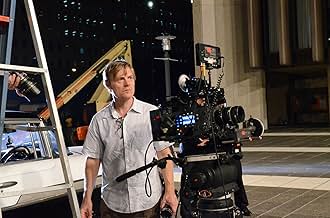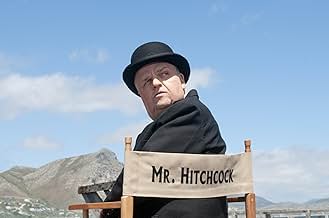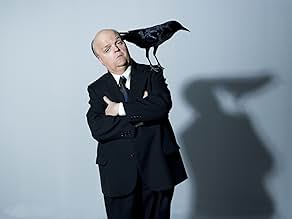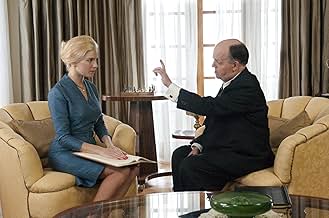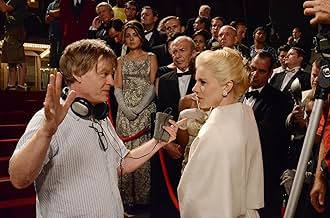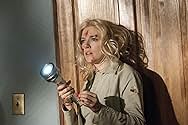IMDb RATING
6.3/10
7.3K
YOUR RATING
The turbulent relationship between filmmaker Sir Alfred Hitchcock (Toby Jones) and actress Tippi Hedren (Sienna Miller).The turbulent relationship between filmmaker Sir Alfred Hitchcock (Toby Jones) and actress Tippi Hedren (Sienna Miller).The turbulent relationship between filmmaker Sir Alfred Hitchcock (Toby Jones) and actress Tippi Hedren (Sienna Miller).
- Nominated for 6 Primetime Emmys
- 3 wins & 36 nominations total
Adrian Galley
- Martin Balsam
- (uncredited)
Louis Joubert
- Reporter
- (uncredited)
Leon Kowalski
- Photographer
- (uncredited)
Sean Cameron Michael
- Robert Burks
- (uncredited)
Carel Nel
- Clapper Loader
- (uncredited)
- Director
- Writers
- All cast & crew
- Production, box office & more at IMDbPro
Featured reviews
As most film buffs are aware, Alfred Hitchcock was a known voyeur and that kink was evident in most of his films and the Director was able to channel that obsession for creative and successful movies. The art form itself is genuinely, by nature, produced to satisfy the voyeuristic tendencies of the audience. No one knew that better than Hitch.
It is also known that he liked blonds with a cool demeanor. But to just what extent he used his leverage over these actresses was not very clear. According to Tippi Hedren, if we are to believe her accounts, this made for HBO Movie is truth told to power (posthumously).
This is an old Hollywood story that used to be referred to as "the casting couch". Here we have an impotent Hitch groping and demanding obedience "available to me in all i desire", a determined, sad old man, that uses his on set Direction to "torture" her with repeated, dangerous and humiliating takes of a scene in The Birds (1963).
But she is a strong and resilient woman who would make another movie, Marnie (1964) with Alfie and then fade to black. The movie makes its points in a straightforward, blemishes and all, account that is well acted by all and, surprisingly, without any flourishes that made Hitchcock a legendary film maker.
It is a sympathetic portrayal of a beautiful woman and a flawed, fat and ugly, powerful man. A Beauty and the Beast story. Not a pleasant situation about an unpleasant, but talented man.
It is also known that he liked blonds with a cool demeanor. But to just what extent he used his leverage over these actresses was not very clear. According to Tippi Hedren, if we are to believe her accounts, this made for HBO Movie is truth told to power (posthumously).
This is an old Hollywood story that used to be referred to as "the casting couch". Here we have an impotent Hitch groping and demanding obedience "available to me in all i desire", a determined, sad old man, that uses his on set Direction to "torture" her with repeated, dangerous and humiliating takes of a scene in The Birds (1963).
But she is a strong and resilient woman who would make another movie, Marnie (1964) with Alfie and then fade to black. The movie makes its points in a straightforward, blemishes and all, account that is well acted by all and, surprisingly, without any flourishes that made Hitchcock a legendary film maker.
It is a sympathetic portrayal of a beautiful woman and a flawed, fat and ugly, powerful man. A Beauty and the Beast story. Not a pleasant situation about an unpleasant, but talented man.
The title should warn you, and if it doesn't then the poster should warn you with the proud foreground stance of the female lead. This isn't a movie for Hitchcock fans. It's a wish-fulfillment movie for women-- in particular, for those who would like to daydream of effortlessly becoming a movie star, beloved by all (as well as being a successful mother who needs no husband to depend on), while maintaining integrity and never buckling under the harassment of piggish men. It even ends by reassuring the daydreamer that given the choice, the wise woman chooses not to pay the price of enduring stardom. Unfortunately, this beauty-and-the-beast tale takes the guise of a true story, and it renders Alfred Hitchcock as not just fat but deformed-- and devoid of understandable motivation. Moreover, there is nothing gradual, subtle, or devious to make his harassment of Tippi Hedren interesting. In a better movie-- a Hitchcockian, gaslight movie-- we would wonder at the beginning whether Hedren were imagining things, and we might even wonder after the end. In this one, though, the story is given no overlay of ambiguity; on the contrary, it is given extra bluntness beyond the known factual version.
Wow! Is that really what happened? In many biographies about Alfred Hitchcock, the most Tippi Hedren ever said about the incident when Alfred Hitchcock supposedly propositioned her was, "Demands were made of me that I could not acquiesce to." But in "The Girl", Toby Jones' Hitchcock puts it right out there when he says to Sienna Miller's Tippi Hedren, "From now on, I want you to make yourself sexually available to me at all times. Whatever I want you to do, whenever I want you to do it."
Possibly it happened that way, Tippi Hedren seems to have been consulted by the filmmakers. My feeling is that where there was that much smoke there had to be fire, but just how fair is "The Girl"?
The movie is nothing less than interesting. Toby Jones is amazing, and Sienna Miller more than holds her own, but opinion over the film is divided. On one side are those outraged that Hitchcock's reputation has been besmirched without a chance to defend himself, while on the other are those outraged at what Hitchcock appears to have done to Tippi Hedren.
"The Girl" relates how Alfred Hitchcock groomed the inexperienced Hedren to star in "The Birds" and "Marnie". During the process, Hitchcock changed from mentor to monster becoming totally obsessed with her. Eventually he made an overt sexual advance. She refused and that was the end of the relationship.
One scene in "The Girl" does undermine it. It's the somewhat salacious screen test where Hitchcock asks Hedren to give Martin Balsam a long lingering kiss. Unfortunately for the makers of "The Girl", the actual test clip is fairly well known from documentaries and YouTube, and is a lot less threatening than the recreation. In reality, Balsam and Hedren actually seem quite comfortable with each other. It was silly to overdo a scene that is so accessible; it leaves you wondering how much over-egging went on with the rest of the custard.
The difference between Hedren and Hitchcock's other leading ladies was that they were better able to handle him. Most were established stars, surrounded by husbands, boyfriends and agents, but Hedren didn't have all that; she was just starting out and was far more vulnerable.
According to some sources, it was about this time that Hitchcock's judgement also seemed to be slipping. The suppressed voyeuristic tendencies and fantasies that helped inform his great films were taking on a harder edge. He now wanted to be explicit in what he showed.
Up until then, the Motion Picture Production Code kept him in check. Would films like "Rear Window", "Vertigo" or even "Psycho" be the enduring classics they are today if Hitchcock had been allowed to go all the way? The censor made him innovative and subtle. However, by the late 60's the Code was gone. No one ever ranks 1972's "Frenzy" among his greatest movies; plenty of rape and nudity on display there. Fortunately he never made "Kaleidoscope"; with what he had planned, it could have been a real legend killer.
As far as "The Girl" is concerned, maybe it's best to just enjoy the show. Toby Jones' Hitchcock is even better than his Truman Capote, genius really, the voice is perfect, and Sienna Miller is so beautiful that you can believe that a fat, old auteur could harbour a fantasy or two about her. But maybe the last words on the subject could be the classic line Hitchcock once directed at an actor who was getting a bit too worked up about things, "Don't worry, it's only a movie".
Possibly it happened that way, Tippi Hedren seems to have been consulted by the filmmakers. My feeling is that where there was that much smoke there had to be fire, but just how fair is "The Girl"?
The movie is nothing less than interesting. Toby Jones is amazing, and Sienna Miller more than holds her own, but opinion over the film is divided. On one side are those outraged that Hitchcock's reputation has been besmirched without a chance to defend himself, while on the other are those outraged at what Hitchcock appears to have done to Tippi Hedren.
"The Girl" relates how Alfred Hitchcock groomed the inexperienced Hedren to star in "The Birds" and "Marnie". During the process, Hitchcock changed from mentor to monster becoming totally obsessed with her. Eventually he made an overt sexual advance. She refused and that was the end of the relationship.
One scene in "The Girl" does undermine it. It's the somewhat salacious screen test where Hitchcock asks Hedren to give Martin Balsam a long lingering kiss. Unfortunately for the makers of "The Girl", the actual test clip is fairly well known from documentaries and YouTube, and is a lot less threatening than the recreation. In reality, Balsam and Hedren actually seem quite comfortable with each other. It was silly to overdo a scene that is so accessible; it leaves you wondering how much over-egging went on with the rest of the custard.
The difference between Hedren and Hitchcock's other leading ladies was that they were better able to handle him. Most were established stars, surrounded by husbands, boyfriends and agents, but Hedren didn't have all that; she was just starting out and was far more vulnerable.
According to some sources, it was about this time that Hitchcock's judgement also seemed to be slipping. The suppressed voyeuristic tendencies and fantasies that helped inform his great films were taking on a harder edge. He now wanted to be explicit in what he showed.
Up until then, the Motion Picture Production Code kept him in check. Would films like "Rear Window", "Vertigo" or even "Psycho" be the enduring classics they are today if Hitchcock had been allowed to go all the way? The censor made him innovative and subtle. However, by the late 60's the Code was gone. No one ever ranks 1972's "Frenzy" among his greatest movies; plenty of rape and nudity on display there. Fortunately he never made "Kaleidoscope"; with what he had planned, it could have been a real legend killer.
As far as "The Girl" is concerned, maybe it's best to just enjoy the show. Toby Jones' Hitchcock is even better than his Truman Capote, genius really, the voice is perfect, and Sienna Miller is so beautiful that you can believe that a fat, old auteur could harbour a fantasy or two about her. But maybe the last words on the subject could be the classic line Hitchcock once directed at an actor who was getting a bit too worked up about things, "Don't worry, it's only a movie".
Overall a decent film but lots of mistakes. All of the major scenes from The Birds only show one camera being used in one take. The phone booth scene, the attic scene for instance. One scene shows Hedren entering the upstairs bedroom already bloodied before she is attacked. The scene where she arrives at Mitch's with the Lovebirds is highly exaggerated. In the film, the ladder is maybe two or three rungs. In The Girl it is like climbing the Empire State Building. The first scene in Marnie at the railroad station was filmed in San Jose not on a soundstage. No biggie. Overall an okay film but could have been better. Now, in regards to Tippi Hedren's allegations. So many people are angry with her for daring to accuse the mighty Hitchcock of sexual harassment. For stabbing him in the back after all that he did for her. For being the only actress who had problems with him. For waiting so long to "come out" with her accusations. Back in 1985 I had a phone conversation with Diane Baker (Hedren's co-star in Marnie) on radio station KGO in San Francisco. Curious about her experience's working with Hitchcock I asked her what it was like. She immediately spent about ten minutes talking about Hitchcock's mistreatment of Tippi Hedren during the filming. She pulled no punches. I had no reason not to believe her. She was there. She saw it. In recent interviews she goes so far as to say she did not like Hitchcock at all. Those who accuse Hedren of being a liar need to add Diane Baker to their list. I believe them both.
The Girl is an interesting movie about Hitchcock's obsession with Tippi Hedren as they made two movies together. It's stylishly made, with good performances. It is focused very much on Hitchcock's cruelty to Hedren.
My main objection to this movie is that its focus makes it rather unbalanced. Hedren herself says this. She says working with Hitchcock was great at first, and while the movie portrays her as dealing with one indignity after another, she says this was only really a problem toward the end of Marnie. It might have been interesting to see more of Hitchock's process - I liked the scene where he helps her work on her lines - but it's a short movie and they had a story to tell.
What is more interesting than the movie is its detractors here. While some people just don't find The Girl interesting, the vast majority seem to dislike it because they don't believe it. Some reviews will even say they're not invested in Hitchcock's reputation, but then follow it up by saying they don't believe this happened.
First off, the movie is based on information from a book by a respected biography writer, based on what he was told by both Hedren and those who worked with her. And Hitchcock was certainly a dark, obsessive, and sometimes cruel (witness his vicious "practical jokes") person. His movies are about obsessions and cruelty, so it would hardly be surprising if he acted poorly with his actress.
Yet, many of the movie's critics express outrage that Hitchcock's name is being besmirched. They say Hedren lied; that she is just trying to scapegoat Hitchcock for her lack of major successes after the Hitchcock films. They say she couldn't act. They say she should have been grateful that Hitchcock gave her a career.
There is a phrase I don't like, because it sounds extremist and harsh and overly politically correct, but that I increasingly realize accurately describes something, and that is "rape culture," the idea that sexual harassment and attacks on women are so ingrained in our society that they aren't even seen as abnormal. The reactions to this movie seem to me examples of this. What is the difference between saying Hedren lied about Hitchcock and the claims that a woman lies about being raped? What does her acting ability have to do with anything? (And what are people basing their assessment on? I suspect most of us have only seen her in two movies, made by a director who got exactly the performances he wanted from his actors).
Many people are saying,essentially, "he didn't do it, and if he did do it, she deserved it."
Look, I understand that people feel a need to defend great artists, but many great artists are not especially great people. That's inevitable; art often comes from a strange place. Don't attack the victim because you think the aggressor was a cool dude.
My main objection to this movie is that its focus makes it rather unbalanced. Hedren herself says this. She says working with Hitchcock was great at first, and while the movie portrays her as dealing with one indignity after another, she says this was only really a problem toward the end of Marnie. It might have been interesting to see more of Hitchock's process - I liked the scene where he helps her work on her lines - but it's a short movie and they had a story to tell.
What is more interesting than the movie is its detractors here. While some people just don't find The Girl interesting, the vast majority seem to dislike it because they don't believe it. Some reviews will even say they're not invested in Hitchcock's reputation, but then follow it up by saying they don't believe this happened.
First off, the movie is based on information from a book by a respected biography writer, based on what he was told by both Hedren and those who worked with her. And Hitchcock was certainly a dark, obsessive, and sometimes cruel (witness his vicious "practical jokes") person. His movies are about obsessions and cruelty, so it would hardly be surprising if he acted poorly with his actress.
Yet, many of the movie's critics express outrage that Hitchcock's name is being besmirched. They say Hedren lied; that she is just trying to scapegoat Hitchcock for her lack of major successes after the Hitchcock films. They say she couldn't act. They say she should have been grateful that Hitchcock gave her a career.
There is a phrase I don't like, because it sounds extremist and harsh and overly politically correct, but that I increasingly realize accurately describes something, and that is "rape culture," the idea that sexual harassment and attacks on women are so ingrained in our society that they aren't even seen as abnormal. The reactions to this movie seem to me examples of this. What is the difference between saying Hedren lied about Hitchcock and the claims that a woman lies about being raped? What does her acting ability have to do with anything? (And what are people basing their assessment on? I suspect most of us have only seen her in two movies, made by a director who got exactly the performances he wanted from his actors).
Many people are saying,essentially, "he didn't do it, and if he did do it, she deserved it."
Look, I understand that people feel a need to defend great artists, but many great artists are not especially great people. That's inevitable; art often comes from a strange place. Don't attack the victim because you think the aggressor was a cool dude.
Did you know
- TriviaRay Berwick, the bird trainer on The Birds (1963), is depicted as having contempt for Sir Alfred Hitchcock, even referring to him at one point as "the old fool". In reality, Berwick always spoke of Hitchcock with the utmost respect and affection, working with him again on Topaz (1969).
- GoofsIn one scene, Hitchcock and the screenwriter of 'Marnie' conduct a conversation in the back of a car en route to the studio. In external shots, the car is seen driving on the right (on temporarily closed roads) but in internal shots the car is driving on the left. The film was made in South Africa, where cars drive on the left.
- Quotes
Alfred Hitchcock: There was a young man from Nantucket / Who had such a large cock he could suck it. / He looked in the glass / And saw his own arse / And broke his neck trying to fuck it.
- ConnectionsFeatured in 70th Golden Globe Awards (2013)
- SoundtracksTristan And Isolde: Act I Prelude
Written by Richard Wagner
Performed by Daniel Barenboim (as Daniel Baranboim)
Details
- Runtime1 hour 31 minutes
- Color
- Sound mix
- Aspect ratio
- 1.78 : 1
Contribute to this page
Suggest an edit or add missing content


